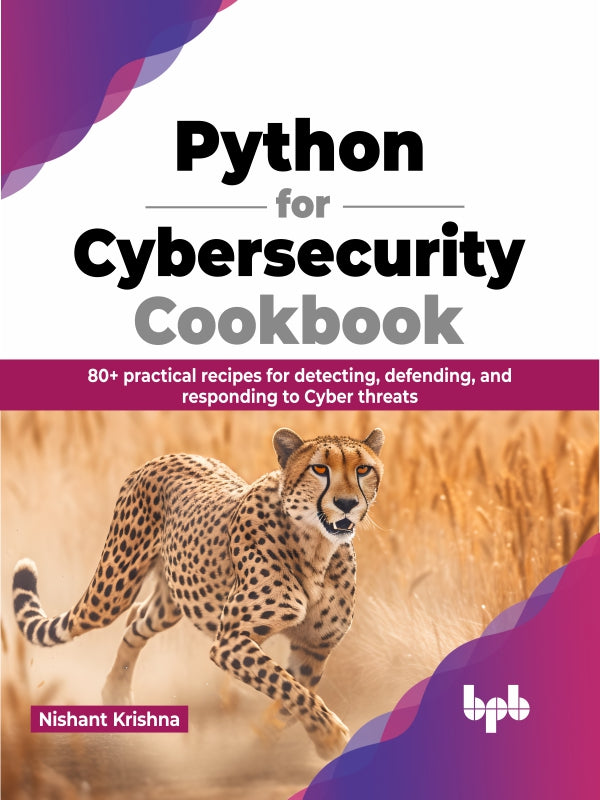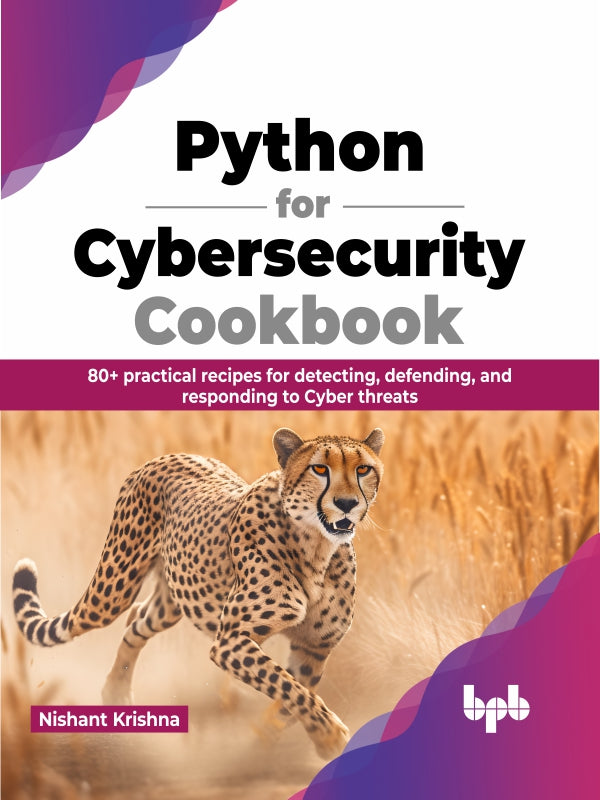Python for Cybersecurity Cookbook
Couldn't load pickup availability
ISBN: 9789355513809
eISBN: 9789355513762
Authors: Nishant Krishna
Rights: Worldwide
Publishing Date: 25th Aug 2023
Pages: 514
Dimension: 7.5*9.25 Inches
Book Type: Paperback

- Description
- Table of Contents
- About the Authors
Python is a powerful and versatile programming language that can be used for a wide variety of tasks, including general-purpose applications and specific use cases in cybersecurity.
This book is a comprehensive guide to solving simple to moderate complexity problems in cybersecurity using Python. It starts with fundamental issues in reconnaissance and then moves on to the depths of the topics such as forensic analysis, malware and phishing analysis, and working with wireless devices. Furthermore, it also covers defensive and offensive security topics, such as system hardening, discovery and implementation, defensive security techniques, offensive security techniques, and penetration testing.
By the end of this book, you will have a strong understanding of how to use Python for cybersecurity and be able to solve problems and create solutions independently.
KEY FEATURES
* Get familiar with the different aspects of cybersecurity, such as network security, malware analysis, and penetration testing.
* Implement defensive strategies to protect systems, networks, and data from cyber threats.
* Discover advanced offensive techniques for penetration testing, exploiting vulnerabilities, and assessing overall security posture.
WHAT YOU WILL LEARN
* Learn how to use Python for cyber forensic analysis.
* Explore ways to analyze malware and phishing-based compromises.
* Use network utilities to gather information, monitor network activity, and troubleshoot issues.
* Learn how to extract and analyze hidden information in digital files.
* Examine source code for vulnerabilities and reverse engineering to understand software behavior.
WHO THIS BOOK IS FOR
The book is for a wide range of people interested in cybersecurity, including professionals, researchers, educators, students, and those considering a career in the field.
1. Getting Started
2. Passive Reconnaissance
3. Active Reconnaissance
4. Development Environment for Advanced Techniques
5. Forensic Analysis
6. Metadata Extraction and Parsing
7. Malware and Phishing Analysis
8. Working with Wireless Devices
9. Working with Network Utilities
10. Source Code Review and Reverse Engineering
11. System Hardening, Discovery, and Implementation
12. Defensive Security Techniques
13. Offensive Security Techniques and Pen Testing
Nishant Krishna is an entrepreneur, writer, and inventor who loves exploring and using new ways to solve complex problems in cybersecurity, system programming, cognitive computing, computer vision, and product scaling to hyper-scale levels. He is a co-founder and CTO of a technology startup, TechMachinery Labs. He is also a co-author for IEEE P1931.1 - Standard for an Architectural Framework for Realtime Onsite Operations Facilitation (ROOF) for IoT, focusing on IoT security and interoperability.
In his software development career of 23 years, he has created many products from scratch, working in various technical roles in the areas of Architecture, Cybersecurity, API Development, Anti- Counterfeiting Technologies, Cloud and Virtualization, Internet of Things (IoT), and Machine Learning. Apart from his day-to-day work, he also works on core research in the areas of cybersecurity and cognitive computing. In cybersecurity, his focus is on cyber forensics and vulnerability assessment.
In his consulting role, he advises many companies in product development, threat surface reduction, database and application scalability, and using standard processes for delivering high-quality products.
Nishant is also a guest professor teaching cybersecurity and cognitive computing to students and faculties in multiple prestigious institutions. As part of his teaching assignments, he tries to find innovative and hands-on ways to teach complex concepts.
Nishant has a Master of Science (MS) in Software Engineering from BITS, Pilani, along with many technical certifications.


